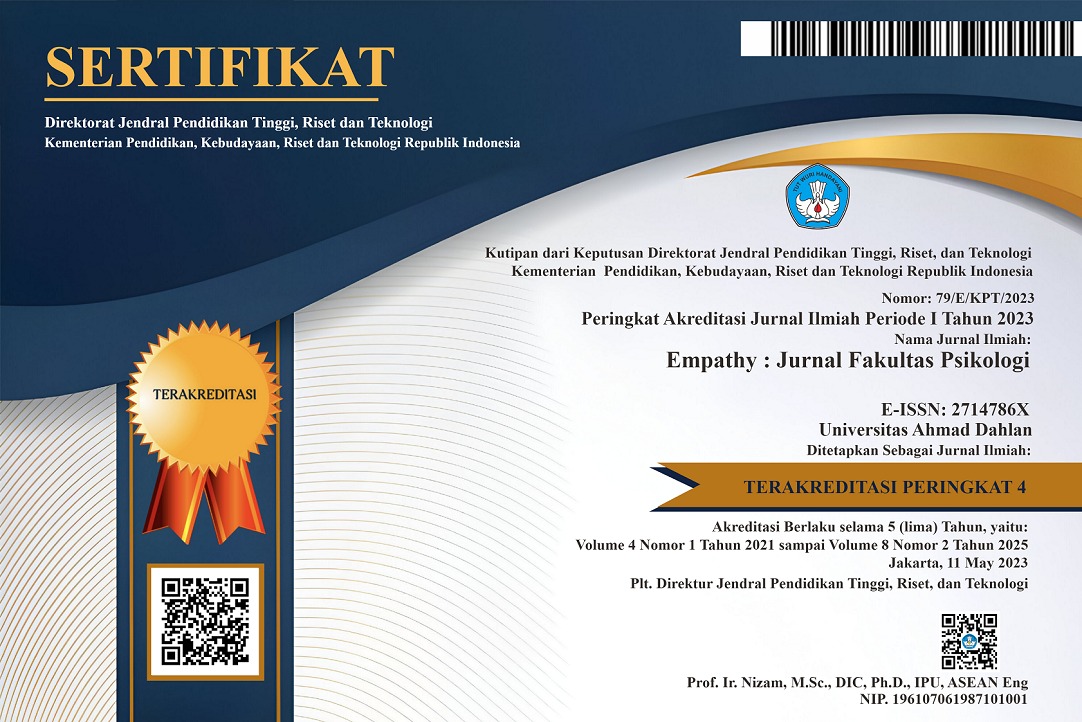Self-awareness of domestic violence in the decision-making of divorced
DOI:
https://doi.org/10.12928/empathy.v6i2.26198Abstract
It is difficult for domestic violence survivors to decide to divorce after experiencing psychological trauma, which decreases the level of their awareness. In this regard, the existential perspective of humanism views self-awareness as one of the factors that can encourage humans to take action to change their living conditions to be better than before. This study aims to explore the process of developing the self-awareness of domestic violence to be able to decide to divorce a husband who committed domestic violence using an existential-humanistic perspective. This study uses a qualitative method with a phenomenological approach and involves three female domestic violence as a research subject. Research data was collected through in-depth interviews by exploring the meaning of the experience of domestic violence survivors who had decided to divorce. The results showed that the divorce decisions taken by the domestic violence survivors were related to increasing self-awareness. Domestic violence survivors who reach a higher level of self-awareness are significantly more empowered and able to make better decisions in their lives.
Keywords: Divorce decision making, domestic violence, self-awareness
References
Lutgendorf, M. A. (2019). Kekerasan pasangan intim dan kesehatan wanita. Obstetri & Ginekologi, 134(3), 470-480.
Hatta, K. (2016). Trauma dan pemulihannya suatu kajian berdasarkan kasus pasca konflik dan tsunami. In Dakwah Ar-Raniry Press.
Goleman, D. (2000). Kecerdasan emosi: mengapa emotional intelligence lebih tinggi daripada IQ. (Hermay, Alih Bahasa). Gramedia Pustaka Utama.
Rivara, F., Adhia, A., Lyons, V., Massey, A., Mills, B., Morgan, E., Simckes, M., & Rowhani-Rahbar, A. (2019). The effects of violence on health. Health Affairs, 38(10), 1622-1629.
Sitawati, L., & Wuryaningsih, C. E. (2019). Fenomena tindak kekerasan terhadap perempuan dan anak: demografi korban, pelaku, dan kejadian. Berita Kedokteran Masyarakat, 34(4), 5-12.
Dewi, M. S., Subardhini, M. S., & Sundayani, Y. (2019). Kecemasan anak korban tindak kekerasan seksual di Yayasan rumah aman sumur Kabupaten Nganjuk. PEKSOS: Jurnal Ilmiah Pekerjaan Sosial, 18(2), 100-111.
Yasegnal, A. S. (2023). Gender-based violence against women: the crisis behind being a restaurant waitress. Journal of Criminal Psychology, 13(1), 34-46.
Ishak, I. M. (2023). Upaya konseling dan pendampingan perempuan korban kekerasan dalam rumah tangga di Unit Pelaksana Teknis Daerah Perlindungan Perempuan dan Anak (UPTD PPA) Kabupaten Jember (Doctoral dissertation, UIN KH Achmad Siddiq Jember).
Dewi, S. S. (2018). Kecerdasan emosional dalam tradisi upa-upa tondi etnis Mandailing. Anthropos: Jurnal Antropologi Sosial dan Budaya (Journal of Social and Cultural Anthropology), 4(1), 79-85.
Mustika, M. (2017). Hubungan self awareness dengan kedisiplinan peserta didik kelas VIII di SMP Wiyatama Bandar Lampung (penelitian korelasional bidang BK pribadi) (Doctoral dissertation, UIN Raden Intan Lampung).
Farah, D. I. (2019). Teori belajar humanistik abraham maslow dan Carl Rogers serta implikasinya dalam pembelajaran pendidikan agama Islam. As-Salam: Jurnal Studi Hukum Islam & Pendidikan, 8(2), 209-230.
Tomaszewski, L. E., Zarestky, J., & Gonzalez, E. (2020). Planning qualitative research: Design and decision making for new researchers. International Journal of Qualitative Methods, 19. 1-7.
Maula, A. R. (2021). Konsep pembelajaran humanistik dan relevansinya dalam pendidikan agama Islam. ATTHULAB: Islamic Religion Teaching & Learning Journal, 6(2), 207-221.
Farid, M., & Sos, M. (2018). Fenomenologi: dalam penelitian ilmu sosial. Prenada Media.
Wijaya, H., & Helaluddin, H. (2019). Analisis Data Kualitatif: Sebuah Tinjauan Teori & Praktik. Sekolah Tinggi Theologia Jaffray.
Sugiyono. (2013). Metode penelitian kuantitatif, kualitatif, dan R &D. Alfabeta.
Hana. (2016). Konseling Eksistensial untuk Meningkatkan Makna Hidup Pada Korban Pelecehan Seksual. Psychology & Humanity, 1(2), 170–175.
Fitri, Q., Mahmud, A., & Saman, A. (2019). Penerapan pendekatan konseling eksistensial humanistik untuk mengurangi perilaku hedonis siswa di SMAN 10 Makassar. Psikopedagogia Jurnal Bimbingan dan Konseling, 6(1), 41-52.
Muzaki, M., & Aldina, S. D. N., (2020). Implementasi konseling eksistensial-humanistik untuk meningkatkan self-esteem pada siswa terisolir di Cirebon. Prophetic: Professional, Empathy and Islamic Counseling Journal, 3(2), 197-210.
Schafer, W. E., & Schafer, W. (2000). Stress Management for Wellness. Harcourt College Publishers.
Tummers, N. E. (2013). Stress Management: A Wellness Approach (1st ed.). Human Kinetics.
Downloads
Published
Issue
Section
License
Authors who publish with Empathy: Jurnal Fakultas Psikologi agree to the following terms:
- Authors retain copyright and grant the journal right of first publication with the work simultaneously licensed under a Creative Commons Attribution License (CC BY-SA 4.0) that allows others to share the work with an acknowledgment of the work's authorship and initial publication in this journal.
- Authors are able to enter into separate, additional contractual arrangements for the non-exclusive distribution of the journal's published version of the work (e.g., post it to an institutional repository or publish it in a book), with an acknowledgment of its initial publication in this journal.
- Authors are permitted and encouraged to post their work online (e.g., in institutional repositories or on their website) prior to and during the submission process, as it can lead to productive exchanges, as well as earlier and greater citation of published work.

This work is licensed under a Creative Commons Attribution-ShareAlike 4.0 International License.



